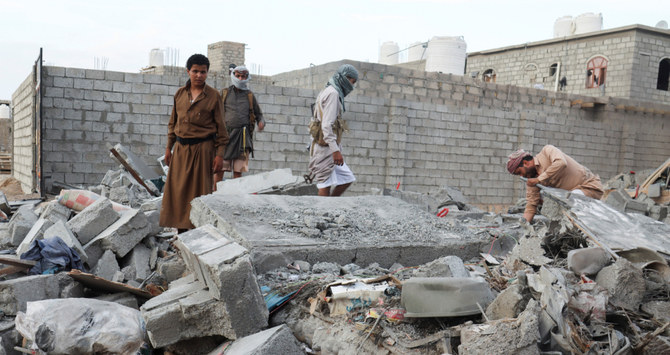AL-MUKALLA: Thousands of Yemenis in Marib’s Al-Abedia district are at risk of dying from starvation due to an ongoing siege by the Houthis, local officials said Wednesday.
The siege has forced government troops and local tribesmen to surrender, with the Iran-backed militia banning residents from leaving and entering the district as well as blocking lifesaving humanitarian assistance from reaching people.
The militia has, at the same time, intensified shelling of residential areas and government fortifications with missiles, mortar rounds, and heavy machine guns.
Local aid organizations and officials said that more than 30,000 people, most of them women and children, were facing mass famine as food was running out in grocery stores. There were also shortages of fuel and medicine, they said.
“Al-Abedia is coming under (Houthi) siege, shelling and assaults on the ground,” Khaled Al-Shajani, deputy head of the Marib office of the Executive Unit for IDP Camps, told Arab News.
He said that local organizations had failed to dispatch humanitarian assistance as the Houthis had tightened their grip on the district’s entrances.
FASTFACT
Local aid organizations and officials said that more than 30,000 people, most of them women and children, were facing mass famine as food was running out in grocery stores. There were also shortages of fuel and medicine.
More than three dozen patients with terminal diseases such as cancer were facing death because the Houthis were not allowing them to seek medication outside the district and were obstructing the distribution of drugs to local health facilities, local officials said.
Al-Shajani urged international aid organizations with offices in Yemen to convince the Houthis to lift their siege of Al-Abedia or send the aid through Qania district.
Marib’s office of the Ministry of Human Rights warned of a health crisis in Al-Abedia as residents were being forced to drink contaminated water and more than 2,465 children suffering from severe malnutrition were in urgent need of medication.
The Houthis have abducted 3,278 people who have tried to leave or enter the district, planted thousands of landmines, and disrupted the education of 8,392 students, the ministry said in a report.
Al-Shajani said that residents had resisted the idea of fleeing their homes, throwing their weight behind government troops defending the district. “The main reason for the district’s resistance against the Houthi assaults is people’s support,” he said.
Local media reports said the Houthis had reneged on promises to open humanitarian corridors into the district in exchange for retrieving the bodies of at least a dozen fighters, following mediation by local dignitaries.
But, in violation of the agreement, the Houthis quickly tightened the siege after receiving the bodies.
Government officials have urged international organizations and powerful countries to break their silence and condemn the Houthis’ shelling and attacks on civilians, mainly in Marib.
Yemen’s Information Minister Muammar Al-Eryani said Tuesday that this silence had encouraged the militia to commit more crimes.
“The international community’s continued heedlessness to the daily massacres and atrocities committed by the Iranian-backed Houthi militia against civilians in Marib province gives negative signals to the militia to continue its crimes and violations,” he said.
Heavy fighting between troops and the Houthis broke out on Wednesday in the provinces of Marib and Taiz, local officials said.
The Houthis intensified their attacks on government troops in areas south of Marib, as Arab coalition warplanes disrupted the militia’s reinforcement attempts.
Fighting also raged for the second day in the southern city of Taiz, as the Houthis attacked the western edges of the city to seize control of a strategic road that links it with Aden.


























